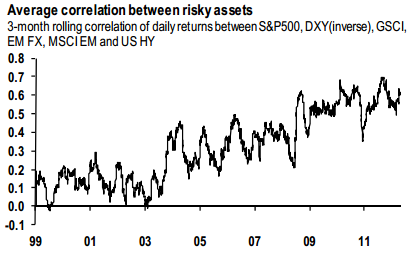Over the past decade (and some would argue longer) average (pairwise) correlation among "risk assets" has been on the rise.

A number of possible causes for this trend have been proposed. So far JPMorgan's write-up on the topic from over a year ago still provides the most reasonable explanation.
JPMorgan (May-2011): - Globalization of capital markets, and new risk-management and alpha extraction techniques have driven the secular increase of cross-asset correlations.
This means that global macro events increasingly drive world financial markets, as investment professionals focus more on central banks than their specific investment mandates. Trading between "risk-on" and "risk-off" dominates valuations across asset classes. Consistent "alpha extraction" is becoming far more difficult and the choice of beta (risk appetite) rather than investment selection differentiates fund managers. The following quote describes quite well the investment climate dominated by rising correlations across risk assets.
JPMorgan (27-Jul-12): - Many investors say they lack conviction, and find it harder to gauge value and market direction amid so much political uncertainty. This uncertainty is breeding inactivity. The steady rise in correlation between risk assets is making it harder to find diversified sources of alpha. US equity managers are having their worst year since 1995 in trying to beat the S&P500, underperforming on average by 1.11% YTD. Hedge fund managers have delivered only some 2% YTD, after fees, pushing them way down in the YTD return hit parade. This lack of active returns is forcing many to stay close to their benchmark and to take less risk.

A number of possible causes for this trend have been proposed. So far JPMorgan's write-up on the topic from over a year ago still provides the most reasonable explanation.
JPMorgan (May-2011): - Globalization of capital markets, and new risk-management and alpha extraction techniques have driven the secular increase of cross-asset correlations.
This means that global macro events increasingly drive world financial markets, as investment professionals focus more on central banks than their specific investment mandates. Trading between "risk-on" and "risk-off" dominates valuations across asset classes. Consistent "alpha extraction" is becoming far more difficult and the choice of beta (risk appetite) rather than investment selection differentiates fund managers. The following quote describes quite well the investment climate dominated by rising correlations across risk assets.
JPMorgan (27-Jul-12): - Many investors say they lack conviction, and find it harder to gauge value and market direction amid so much political uncertainty. This uncertainty is breeding inactivity. The steady rise in correlation between risk assets is making it harder to find diversified sources of alpha. US equity managers are having their worst year since 1995 in trying to beat the S&P500, underperforming on average by 1.11% YTD. Hedge fund managers have delivered only some 2% YTD, after fees, pushing them way down in the YTD return hit parade. This lack of active returns is forcing many to stay close to their benchmark and to take less risk.
3rd party Ad. Not an offer or recommendation by Investing.com. See disclosure here or remove ads.
Which stock should you buy in your very next trade?
With valuations skyrocketing in 2024, many investors are uneasy putting more money into stocks. Unsure where to invest next? Get access to our proven portfolios and discover high-potential opportunities.
In 2024 alone, ProPicks AI identified 2 stocks that surged over 150%, 4 additional stocks that leaped over 30%, and 3 more that climbed over 25%. That's an impressive track record.
With portfolios tailored for Dow stocks, S&P stocks, Tech stocks, and Mid Cap stocks, you can explore various wealth-building strategies.
